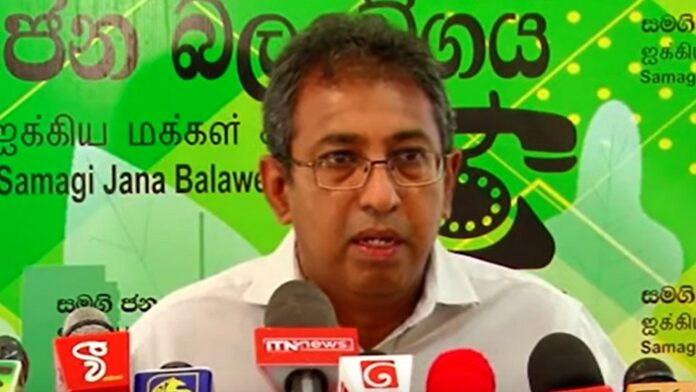By: Staff Writer
February 04, Colombo (LNW): The Samagi Jana Balawegaya (SJB) has launched a strong critique against the Government, accusing it of failing to uphold key economic promises and mismanaging critical financial and governance issues.
Addressing a media briefing, SJB MP Dr. Harsha de Silva highlighted concerns over tax policy reversals, questionable debt restructuring strategies, unfulfilled energy promises, and rising corruption scandals. He asserted that the administration’s failure to address these matters threatens both public trust and economic stability.
Dr. de Silva criticized the Government’s inconsistent tax policies, pointing out its reversal on an earlier promise to raise the tax threshold from Rs. 100,000 to Rs. 200,000. He accused officials of misleading the public, first pledging an increase and later denying any such commitment. This backtracking, he argued, has significantly eroded confidence in the administration’s economic direction.
Questioning the Government’s debt restructuring strategy, Dr. de Silva referenced President Anura Kumara Dissanayake’s recent statement that the country had two potential paths—either restructuring its debt or reviving the economy without it. Despite claims that Sri Lanka emerged from bankruptcy on December 21, he noted that the administration has yet to clarify how its policies will translate into real economic improvements for citizens. He further suggested that this uncertainty signals a lack of coherent economic planning.
Addressing energy policy, the SJB MP accused the Government of failing to deliver on its commitment to reduce electricity tariffs by 33%. He credited opposition efforts and public advocacy for pressuring the Public Utilities Commission of Sri Lanka (PUCSL) to implement recent tariff cuts.
Regarding fuel pricing, Dr. de Silva alleged that the Government is artificially maintaining current prices until the Provincial Council elections, despite incurring a Rs. 20 per litre loss. Given that the Ceylon Petroleum Corporation (CPC) controls 55% of the market, he warned that such price manipulation could lead to future tax hikes, particularly in vehicle taxation.
Beyond economic issues, Dr. de Silva raised serious corruption allegations, particularly concerning 323 shipping containers that reportedly left Colombo Port without proper inspection. He described this as part of a broader pattern of systemic corruption within Sri Lanka Customs.
He also called out the Secretary to the President, who has experience in investigating Customs corruption but has remained silent on this particular issue. Given his past role advising the World Customs Organisation on anti-corruption strategies, Dr. de Silva questioned the lack of action and suggested possible political interference.
Furthermore, he accused the Government of contradicting its ideological stance, arguing that it has embraced a “far-right” economic model despite its socialist rhetoric. He pointed to the National People’s Power (NPP), which previously challenged the Economic Transformation Act in the Supreme Court but has since incorporated it into its economic framework.
Dr. de Silva concluded by asserting that the Government’s inability to follow through on its promises, combined with rising corruption concerns, poses a serious challenge to its credibility. He called for greater transparency and accountability to restore public trust and ensure economic stability.

